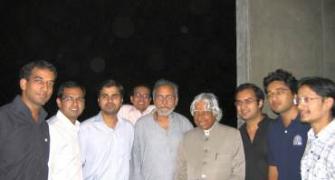 Suman Guha Mozumder
Suman Guha Mozumder
According to a study a growing number of Indian Americans are returning to their homeland in search of better prospects
A small but growing number of second-generation Indian Americans are moving or considering moving to their India for professional and personal reasons, according to a Duke University study released last month.
"My findings suggest those economic opportunities in India as well as a desire to connect or reconnect with India have 'pulled' the second-generation there," Sonali Jain, postdoctoral associate, Social Sciences Research Institute, Duke University, told India Abroad.
"The respondents' reasons for return were not due to unemployment, limited economic opportunities or the recent economic downturn in the United States.
At the time of my interviews -- in the summer of 2008 and the spring of 2009 -- respondents on average had spent 25 months in India and so 'returned' before the onset of the economic downturn in the US. Many of them had quit professional, well-paying jobs and
their initial decision to return to India was not because of the recent economic downturn in the US."
The data has been drawn from a larger qualitative study on the 'return' of high-skilled, second-generation Indian Americans to India. The respondents were born or raised in the US before the age of 12.
They are the children of the largely professional Indian immigrants, who entered the US between 1965, when changes in immigration law made skilled migration from Asia and other parts of the world possible, and the early 1980s.
The respondents grew up in professional, middle-class families in the US, with the majority of them having been raised in California, New York, and New Jersey, where their first-generation parents continued to live.
The study, Jain said, suggests that the emerging economies of the parents' homeland might have encouraged the children to make an economic investment there. Many among them wanted to learn more about their parental homeland, ethnicity, and heritage.
Most respondents were graduates of prestigious US universities or had worked in internationally recognised organisations prior to their return.
They found jobs in India -- mostly in the information technology, finance and media sectors -- using professional and school-based networks.
'Because they wanted to experience India as independent, unsupervised adults, the respondents in general did not prefer to live in cities or towns where their extended family resided,' the study said.
Most of the returnees have gone for a five-year period.
"The second-generation respondents in my sample moved to India with the intention of living there for a finite time-period.
As relatively privileged, highly-educated and qualified professionals, there were fewer constraints on respondents' geographic mobility," said Jain, who is affiliated with the Center on Globalisation, Governance and Competitiveness.
"They anticipate returning to the US in a few years because they consider the US their home, and this is where their parents continue to live. Their fondness of the US and India is not mutually exclusive."
In 2009, Vivek Wadhwa, Duke University professor and BusinessWeek.com columnist, had speculated that due to the recession over 100,000 Indians and as many Chinese would return home over the next three to five years.
In his two-year study of Indian and Chinese returnees, Wadhwa found that while the expiration of their US visa caused some returnees to depart, the most significant factors in the decision to return were career opportunities, family ties and quality of life.
The Duke study noted that all respondents asserted that the availability of exciting professional career pathways in India was an important factor in influencing their return.
Many of those who returned to India said they held positions -- in the middle-to-upper echelons of management -- that would have taken them five or more years to achieve in the US because such opportunities were unavailable to persons of their age and work experience.
"Because the Indian economy is currently on an upswing when compared to the US, it is likely that higher numbers of second-generation Indian-American professionals will decide to relocate to India for economic opportunities and to strengthen their future job prospects in the global labor market," Jain concluded.
"Increasingly, studies suggest that companies in India are also keen on recruiting Western talent and a more diverse work force, and this further creates an environment conducive to relocation."
Photo: Indian Americans celebrate Diwali in Jersey City








